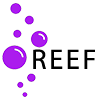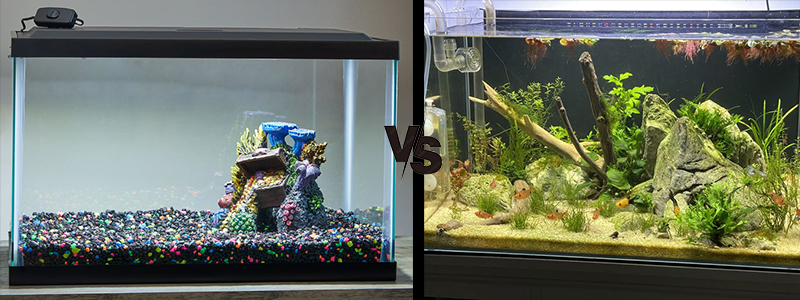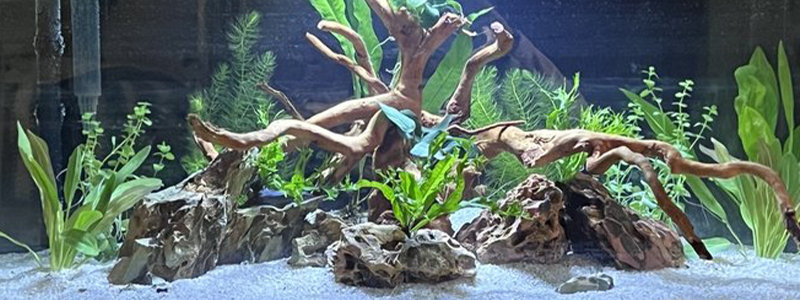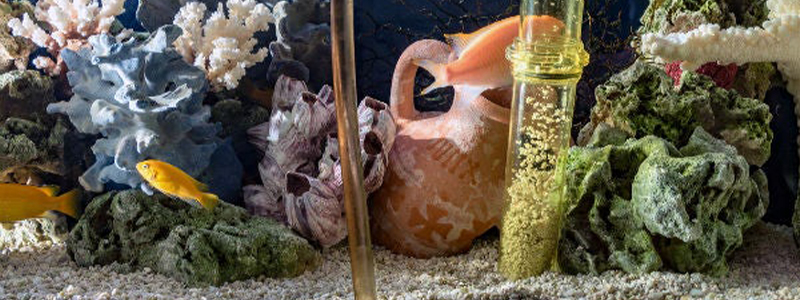Unfortunately, not every aquarium hobbyist is aware that do plant needs fertilizer, and if they do, then how often to fertilize aquarium plants. And this is why; some aquariums look lifeless at times!
When it comes to designing a beautiful aquarium with vibrant plant life, three key factors cannot be overlooked: adequate lighting, the right type of substrate, and essential nutrients from fertilizer for aquarium plants.
However, beginners tend to underestimate the significance of aquarium plant fertilizer safe for fish due to the complexity of types of fertilizer and concerns about nutrient imbalances. This article will take you through different types of fertilizer for aquarium plants available in the market and how they can be utilized in the best way for optimal results.
Disclosure: This article contains affiliate links. When you follow a link to purchase the products, I sometime earn a commission, at no additional cost to you. Read my full disclosure here.
Why Do Aquarium Plants Need Fertilizer?
Now, one must be probably wondering why do aquarium plants need fertilizer when they can take nutrients from the surrounding. Well, the answer is: Just like all humans need essential nutrients despite having the body’s own nutrients!
Similar to humans, aquarium plants also need important nutrients for their growth and development. Macronutrients like nitrogen, phosphorus, and potassium are essential elements that plants require in large quantities. Additionally, micronutrients such as boron, iron, and manganese are required in lesser amounts.
Thus, when your body is lacking any of these nutrients, it can lead to abnormal plant growth or could also stop their ability to grow at all. The fertilizer for aquarium plants plays are extremely important role providing the nutrients for aquarium plants to ensure they have healthy growth.
Types of Fertilizer for Aquarium Plants
- Liquid Fertilizer: Added to the aquarium, liquid fertilizer for aquarium plants is ideal for plants that derive nutrients from the water column. This includes like Java Ferns, Anubias, Mosses, and floating plants. Liquid aquarium plant fertilizer safe for fish directly supplies vital nutrients to these plant varieties.
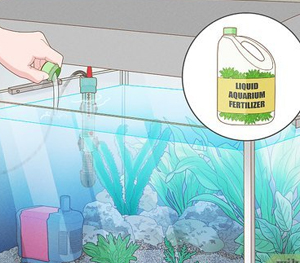
- Prepacked Substrate: This prepacked substrate fertilizer to make plants greener is a unique type of fertilizer for aquarium plants’ soil that acts as a nutrient-rich medium for root-feeding plants such as Amazon Swords, Vallisneria, and Cryptocoryne. Substrates like Fluval Stratum aquarium plant fertilizer safe for fish release essential nutrients to the roots of these plants without causing any cloudiness in water or outbreaks of algae.
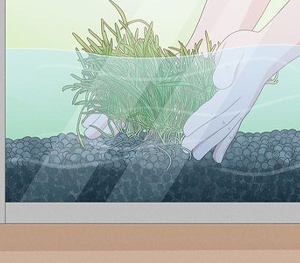
- Root Tabs: Compressed aquarium plant fertilizer safe for fish called “Root Tabs” are perfect for inert substrates and root-feeding plants. This fertilizer to make plants greener and disintegrate over time after being buried close to the roots, supplying nutrients for weeks without further effort.
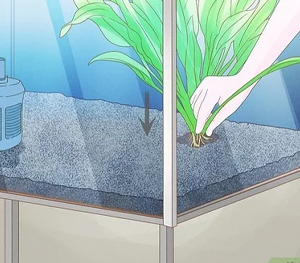
Best Aquarium Plant Fertilizer Safe for Fish
So, as we have introduced you above to different types of fertilizer to make plants greener, it’s time to check out some best aquarium plant fertilizer safe for fish. Make sure to go through each fertilizer for aquarium plants thoroughly because we are going to share its pros and cons as well!
1. Easy Green – All-in-One Fertilizer
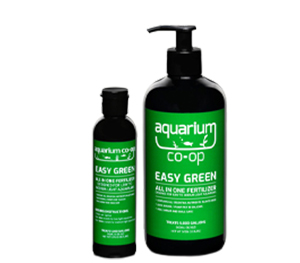
Aquarium Co-Op
Available in: Australia, Canada, UK and US
Easy Green fertilizer to make plants greener is a convenient and effective fertilizer for aquarium plants that contains all the necessary macronutrients and micronutrients. It is ideal for tanks with multiple plants and an average bioload. If you have root-feeding plants, you can complement Easy Green with Easy Root Tabs specifically designed for inert substrates. The dosage of Easy Green aquarium plant fertilizer safe for fish depends on the light levels in your tank, and ensuring 50 ppm of nitrates can be easily achieved by using a test strip.
Direction: To use, simply add one pump per 10 gallons of water every week if your tank has low to medium lighting conditions; however, if it’s a medium to high-light tank, double the dose accordingly. A single bottle of this product should last approximately one year when used on a low-light 55-gallon tank.
2. API Leaf Zone
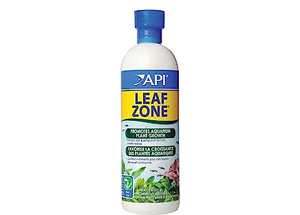
Quick view on Amazon
Available in: Australia, Canada, UK and US
API Leaf Zone fertilizer for aquarium plants is an affordable liquid fertilizer designed for low-maintenance planted tanks that have a significant amount of organic waste. This fertilizer to make plants greener primarily consists of potassium and iron, with the assumption that there will be enough nitrogen and phosphorus provided by fish waste.
However, it does not contain other essential micronutrients. To use this aquarium plant fertilizer safe for fish effectively, you will need to dilute it before application and apply it frequently. While API Leaf Zone can provide basic care for your plants, the growth results might not be extraordinary.
Directions: Weekly addition of 5 mL per 10 gallons.
3. Seachem Flourish Series
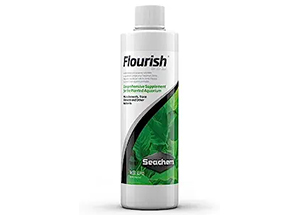
Quick view on Amazon
Available in: Australia, Canada, UK and US
If you’re looking to enhance the growth of your planted tank, Seachem Flourish aquarium plant fertilizer safe for fish offers a range of nutrient supplements that can be tailored to meet specific requirements. Whether you have a heavily stocked tank, hard water, or different light levels, there is fertilizer for aquarium plants options available for everyone.
As your knowledge grows and plant needs change over time, additional products like Flourish Trace fertilizer to make plants greener may become necessary. For addressing nitrogen or phosphorus deficiencies in your plants’ diet, there are products like Flourish Nitrogen and Phosphorus available as well. However, managing multiple bottles and adhering to dosing schedules might require some effort initially.
Directions: Each supplement has its own recommended dosage, which you should always abide by.
4. ADA Aqua Soil Amazonia
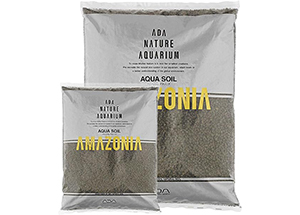
Quick view on Amazon
Available in: Australia, Canada, UK and US
ADA substrate fertilizer to make plants greener is especially beneficial to plants with heavy root systems and low-growing carpet. However, this initially releases ammonia into the water, which can make it appear cloudy and lower the pH level while also reducing water hardness.
Additionally, this substrate fertilizer for aquarium plants requires replacement every one to two years due to its gradual breakdown over time. It may not be suitable for aquariums that already house fish because the leaching ammonia could negatively affect their health.
5. UP Aqua Sand
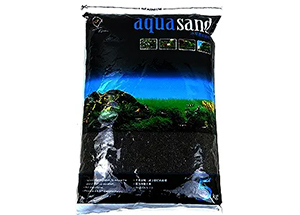
Quick view on Amazon
Available in: Australia, Canada, UK and US
The UP Aqua Sand is a soil substrate that consists of small molecules. This aquarium plant fertilizer safe for fish is commonly used to enhance the growth of aquatic plants in fish tanks. Unlike ADA Aqua Soil fertilizer for aquarium plants, it doesn’t produce much ammonia, making it more suitable for tanks that have already been established.
However, it’s worth noting that using this sand fertilizer to make plants greener may result in lower pH levels and hardness in your water, so if you have a soft water setup, alternative options may be more appropriate.
6. API Root Tabs
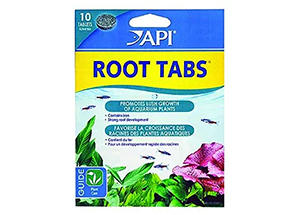
Quick view on Amazon
Available in: Australia, Canada, UK and US
While lacking in macro- and micronutrients, API Root Tabs fertilizer for aquarium plants do provide some nutrients like potassium and iron. More nutrients are available for less money with Seachem Flourish Tabs fertilizer to make plants greener.
How Often to Fertilize Aquarium Plants?
For everyone who is wondering how often to fertilize aquarium plants- there is no definite answer! All that matters here is the type of plants you have in your aquarium.
The amount of fertilizer for aquarium plants required for aquarium plants can vary based on the specific species. Certain low-maintenance plants may receive enough nutrients from the water and substrate, while others, particularly red-leaf plants, might need regular doses of both micronutrients and macronutrients, possibly up to twice a week.
Nevertheless, in general, using fertilizer to make plants greener once every week should be sufficient to support their overall growth and well-being.
How to Choose the Right Fertilizer to Make Plants Greener?
Finding the perfect aquarium plant fertilizer safe for fish can be tricky because it depends on their individual requirements and growth patterns.
If you have plants with roots, using substrates or root tabs is usually a good idea as they provide long-lasting nourishment. On the other hand, if you’re dealing with floating plants, liquid fertilizer to make plants greener, they are often more suitable to meet their nutrient needs.
Moreover, ensuring there is adequate water flow throughout the tank will help deliver nutrients uniformly to all of your plants. Remember that every plant species has its own specific requirements, so make sure that you keep an eye on them and adjust your fertilization technique accordingly.
By doing so, you’ll create an optimal environment for both thriving aquatic plants and aesthetic appeal.
Conclusion
To sum up, the process of fertilization plays an important role in building a suitable plant bed in aquarium. Those who are new to this can build their confidence by understanding more about the different types of fertilizer for aquarium plants available and the specific requirements of plants.
By acquiring knowledge and practicing proper care, aquarium plant fertilizer safe for fish becomes an invaluable technique for nurturing a lively and fulfilling aquatic setting or garden atmosphere.
